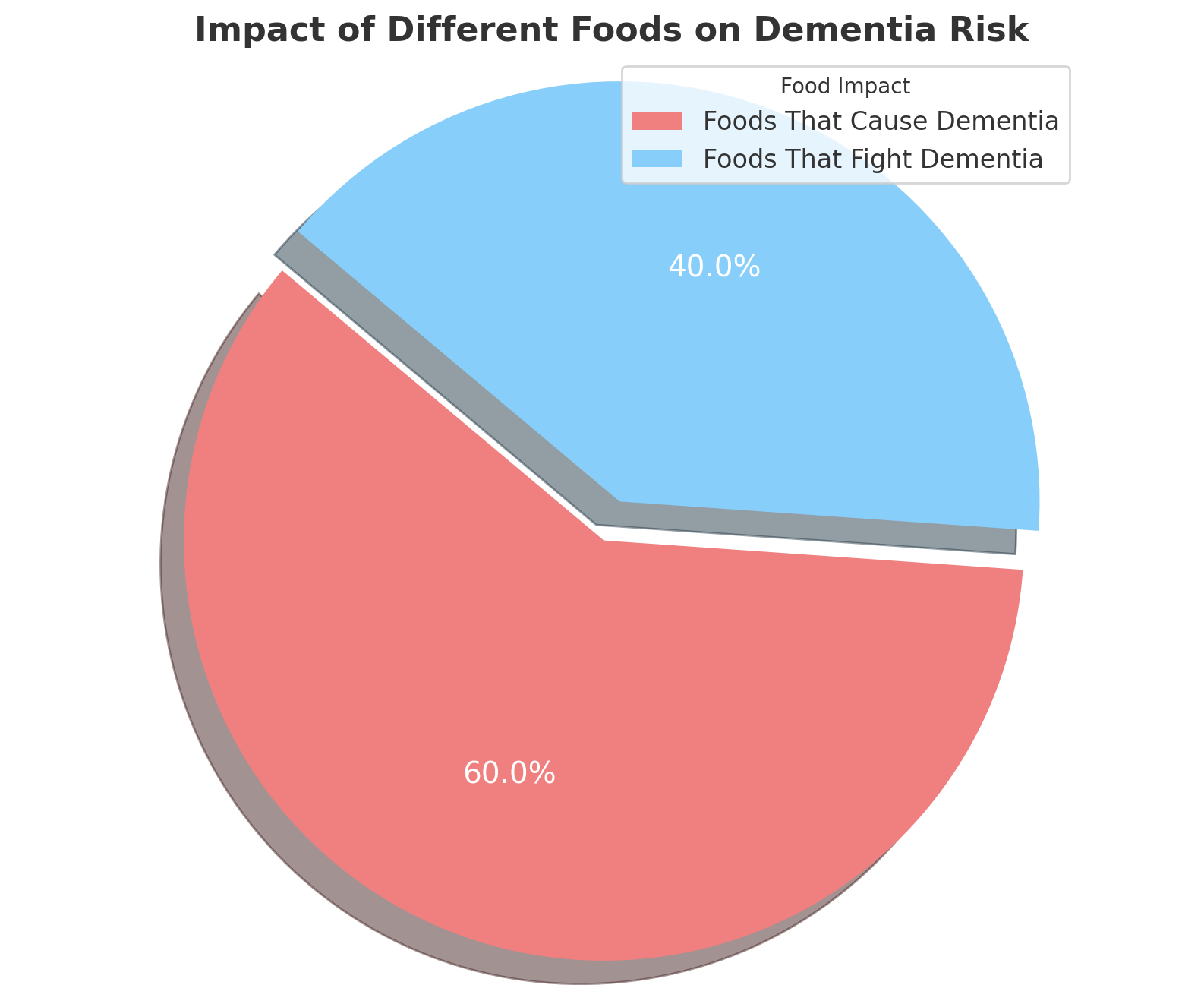Blog Outline
- The Importance of a Dementia Prevention Diet: How What You Eat Can Support Brain Health
- Foods That Contribute to Dementia vs Foods That Fight Dementia
- The Best Foods for People Living with Dementia
- Foods to Avoid for Dementia Prevention
- The Role of Sugar: Can Cutting It Out Reverse Dementia?
- Implementing a Diet to Help Reverse the Effects of Dementia
- Nutrition and Dementia: A Comprehensive Approach
- Conclusion
As dementia research advances, scientists are discovering just how much diet and nutrition impact brain health. Understanding these connections is crucial for developing effective strategies to prevent and manage dementia. By making smart food choices, we can help protect our brains, ensuring a better quality of life for millions of people worldwide.
The Importance of a Dementia Prevention Diet: How What You Eat Can Support Brain Health
Adopting a diet that focuses on dementia prevention is one of the most promising approaches emerging from recent research. Studies conducted by the National Institute on Aging (NIA) emphasize that certain dietary patterns can significantly reduce the risk of developing dementia. For instance, the Mediterranean diet, which is rich in fruits, vegetables, whole grains, and healthy fats, has been linked to a lower risk of cognitive decline.
According to the Alzheimer’s Society, maintaining a balanced diet can reduce the risk of dementia by up to 23%. This dietary approach focuses on incorporating the best foods for dementia prevention and management while avoiding those that may contribute to cognitive decline. The emphasis is not only on what to add to your meals, but also on what to exclude. This comprehensive nutritional plan supports brain health and helps protect against dementia.
Recent studies suggest that diets high in antioxidants and anti-inflammatory properties are vital for protecting the brain from oxidative stress and inflammation, both of which are linked to cognitive deterioration. Incorporating various nutrient-dense foods ensures that the brain receives the essential vitamins and minerals needed for optimal functioning.
Foods That Contribute to Dementia vs Foods That Fight Dementia
While some foods can increase the risk of dementia, others can serve as powerful allies in combating cognitive decline. Foods that contribute to dementia often have high levels of saturated fats and sugars, which can lead to inflammation and oxidative stress in the brain. For instance, processed meats, sugary snacks, and sodas not only contribute to overall poor health but also negatively impact brain function.
Conversely, foods that fight dementia are typically nutrient-dense and include leafy greens, fatty fish, nuts, and berries. Leafy greens like spinach and kale are rich in vitamins E and K, which have been linked to slower cognitive decline. Fatty fish, such as salmon and mackerel are excellent sources of omega-3 fatty acids, essential for maintaining healthy brain cells and reducing inflammation.
Incorporating these beneficial foods into daily meals can help protect brain health and enhance cognitive function. For example, foods like blueberries and walnuts have been shown to improve memory and learning abilities, making them excellent choices for those looking to maintain or boost their cognitive health.
Figure 1: Impact of Various Foods on Dementia Risk (Source: Harvard T.H. Chan School of Public Health)
The Best Foods for People Living with Dementia
For individuals diagnosed with dementia, maintaining a balanced diet is essential. The best foods for people living with dementia include omega-3-rich fish like salmon, which supports brain health, and antioxidant-rich foods, such as blueberries and spinach, which help reduce oxidative stress. Additionally, foods that are easy to prepare and consume, will help ensure that nutritional needs are consistently met.
5 Foods to Help Prevent Dementia:
- Blueberries – High in antioxidants that protect the brain from oxidative stress.
- Fatty Fish – Rich in omega-3 fatty acids that support brain cell structure and function.
- Leafy Greens – Loaded with vitamins and minerals essential for cognitive health.
- Nuts – Provide healthy fats and protein that sustain energy and brain function.
- Whole Grains – Offer sustained energy and fiber, helping maintain steady blood sugar levels.
Incorporating these foods into meals can help dementia patients maintain better cognitive function and overall health. For instance, starting the day with a bowl of oatmeal topped with blueberries offers both fiber and antioxidants, setting a positive tone for the day.
Foods to Avoid for Dementia Prevention
Preventing dementia also involves understanding what foods to avoid. Foods high in sugar and refined carbohydrates can lead to insulin resistance and increased inflammation, both of which are linked to cognitive decline. Common culprits include sugary snacks, sodas, and processed foods. By eliminating these from the diet, individuals can lower their risk of developing dementia and maintain better overall brain health.
Processed foods contain unhealthy trans fats and additives that can impair cognitive function. Moreover, excessive sugar intake is associated with poor vascular health, which can adversely affect brain function over time. Reducing consumption of these harmful foods is a critical step in maintaining cognitive health and preventing the onset of dementia.
The Role of Sugar: Can Cutting It Out Reverse Dementia?
One of the most debated topics in dementia research is whether cutting out sugar can reverse the condition. While eliminating excessive sugar intake is beneficial for reducing inflammation and improving insulin sensitivity, which is crucial for brain health, current studies suggest that it may not be sufficient to completely reverse dementia. However, reducing sugar consumption can slow the progression of cognitive decline and improve the quality of life for those living with dementia.
Research indicates that high sugar levels can lead to the formation of advanced glycation end products (AGEs), which are harmful compounds that can damage brain cells and exacerbate cognitive decline. By minimizing sugar intake, people can help protect their brains from these damaging effects and support overall neurological health.
Implementing a Diet to Help Reverse the Effects of Dementia
A diet to help reverse the effects of dementia focuses on incorporating the best foods for your brain health while avoiding those that contribute to cognitive decline. This dietary approach emphasizes whole, unprocessed foods, lean proteins, healthy fats, and plenty of fruits and vegetables. Foods to limit include processed meats, sugary beverages, and trans fats, while beneficial options include green leafy vegetables, nuts, and whole grains.
This diet involves careful meal planning and a commitment to making healthier food choices. For instance, swapping out white bread for whole grain alternatives, choosing baked or grilled fish over fried options, and snacking on nuts instead of sugary treats can make a significant difference in brain health over time.
Additionally, staying hydrated and moderating caffeine intake can also support cognitive function. Incorporating a variety of textures and flavors can make meals more enjoyable, ensuring that individuals adhere to their dietary plans consistently.
Nutrition and Dementia: A Comprehensive Approach
The relationship between nutrition and dementia is complex and multifaceted. Comprehensive research indicates that a combination of dietary interventions, physical activity, and mental stimulation can significantly impact brain health. Dementia and food are intrinsically linked, with proper nutrition playing a pivotal role in both prevention and management. Meals for people living with dementia should be tailored to individual needs, ensuring that each dish supports cognitive function and overall well-being.
In addition to diet, regular physical exercise has been shown to improve blood flow to the brain, reduce inflammation, and promote the growth of new brain cells. Engaging in mental activities such as puzzles, reading, and social interactions can further enhance cognitive resilience and help delay the onset of dementia symptoms.
Managing stress through relaxation techniques like meditation and yoga can significantly contribute to better brain health. By adopting a holistic approach that combines nutrition with other healthy lifestyle practices, individuals can create a strong defense against cognitive decline and dementia.
Conclusion
As dementia research advances, the role of diet and nutrition in the prevention and management of dementia becomes increasingly clear. By adopting a healthier diet, avoiding harmful foods, and focusing on nutrient-rich options, individuals can proactively protect their brain health.
At Sheraton Caregivers, we support these efforts with personalized care plans that incorporate the latest findings in dementia research. For individuals and families in Connecticut, our compassionate team provides comprehensive support tailored to the unique needs of people living with dementia. We assist with daily activities, ensure a safe and nurturing home environment, and provide emotional support to clients and their loved ones, promoting dignity and quality of life
Our services seamlessly integrate with your loved one’s lifestyle, encouraging autonomy and personal growth. From medication management to creating stimulating environments, Sheraton Caregivers ensures each individual receives tailored care.
Choosing Sheraton Caregivers means partnering with a team committed to compassion and excellence in care. Let us help you navigate the complexities of dementia care, providing peace of mind and improved quality of life for your loved ones in Connecticut.


